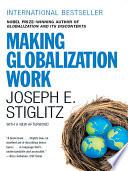Works

Making Globalization Work
Joseph E. Stiglitz
Whither Socialism?
Joseph E. StiglitzFamous Joseph E. Stiglitz Quotes
“Development is about transforming the lives of people, not just transforming economies.”
Source: Making Globalization Work
Interview on Bebbe Grillo's Blog http://www.beppegrillo.it/eng/2007/01/stiglitz.html, January 2007.
“My teachers helped guide and motivate me; but the responsibility of learning was left with me.”
Autobiographical Essay (2001)
Autobiographical Essay (2001)
Joseph E. Stiglitz Quotes
Source: Whither Socialism? (1994), Ch. 1 : The Theory of Socialism and the Power of Economic Ideas
Autobiographical Essay (2001)
“The reason that the invisible hand often seems invisible is that it is often not there.”
Quoted in Daniel Altman, "Managing Globalization: Q & A with Joseph Stiglitz" http://blogs.iht.com/tribtalk/business/globalization/?p=177, The International Herald Tribune (2006-10-11).
Autobiographical Essay (2001)
Autobiographical Essay (2001)
"The Causes and Consequences of The Dependence of Quality on Price", Journal of Economic Literature, Vol. 25, No. 1 (Mar., 1987)
"Bleakonomics" http://www.nytimes.com/2007/09/30/books/review/Stiglitz-t.html?_r=2&adxnnl=1&oref=slogin&ref=books&adxnnlx=1191080508-xgqHp+i170M7vW5X5Q4Yeg&oref=slogin The New York Times Sunday Book Review (2007-09-30).
Autobiographical Essay (2001)
"Nobel Prize Lecture" http://nobelprize.org/mediaplayer/index.php?id=507 Information and the Change in the Paradigm in Economics, at Aula Magna, Stockholm University, (2001-12-08).
Interview with Nathan Gardels, The Huffington Post, September 16th 2008 http://www.huffingtonpost.com/nathan-gardels/stiglitz-the-fall-of-wall_b_126911.html?show_comment_id=15934161
"Of the 1%, by the 1%, for the 1%" http://www.vanityfair.com/society/features/2011/05/top-one-percent-201105, Vanity Fair, May 2011.
Autobiographical Essay (2001)
Autobiographical Essay (2001)
§10, p. 284
Making globalization work (2006)
§8
Making globalization work (2006)
idem, p. 207
Making globalization work (2006)
§4.2 TRIPs, p. 117
Making globalization work (2006)
“Intellectual property does not really belong in a trade agreement.”
§4.2 TRIPs, p. 116
Making globalization work (2006)
§4, p. 106
Making globalization work (2006)
§3, p. 81
Making globalization work (2006)
§3, p. 62
Making globalization work (2006)
§2, p. 58
Making globalization work (2006)
"The end of neoliberalism and the rebirth of history" https://www.socialeurope.eu/the-end-of-neoliberalism-and-the-rebirth-of-history, Social Europe, November 2019
The fact that so many people in the establishment seemed to do so — as they had accepted colonialism, slavery, and other forms of oppression — left a life-long mark. It reinforced a distrust of authority which I had had from childhood
Autobiographical Essay (2001)
§5, p. 149
Making globalization work (2006)
§3, p. 100
Making globalization work (2006)
§2, p. 52
Making globalization work (2006)
